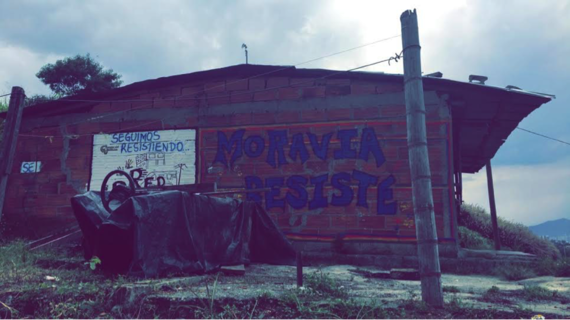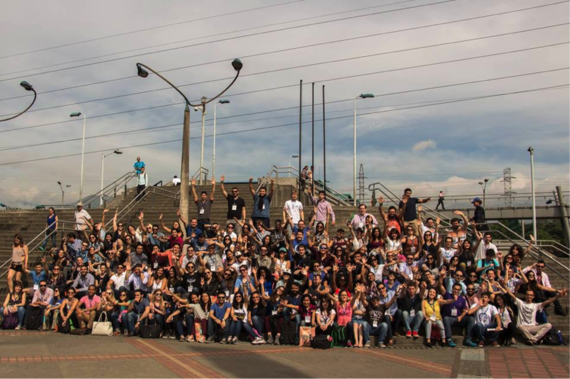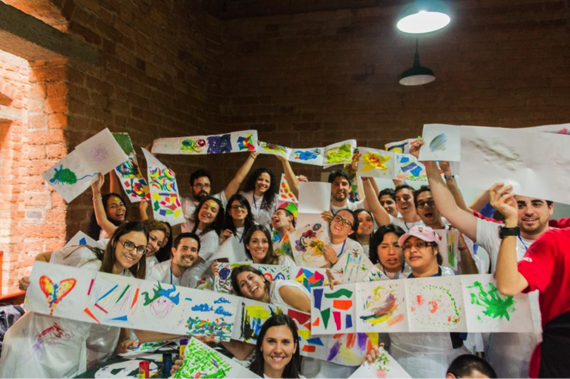"The strongest are not those who create change, but those who adapt to it." - Neira, 30, Moravia, Medellin.
Neira, a resident from Moravia, one of the poorest neighborhoods in Medellin that transformed from dumpster to urban garden, explained in one sentence what 168 millennials from the region set forth to discuss in three days at the annual meeting of the Global Shapers in Latin America, #ShapeLatAm: Resilience.
Resilience, as defined by Merriam-Webster, is "an ability to recover from or adjust easily to misfortune or change." It's a quality we associate with grit, elasticity and innovation.
Resilience is in vogue. International organizations, governments and businesses alike are championing resilience as a key focus in planning for the future. We want to have more of it and hold on to it, especially in our current state of volatility, where political and social crises have left many feeling like more difficult times are what lay ahead.
It seems, though, that rather than resilience manifesting itself from top-down international synchronicity, the "city" -more specifically, leading Latin American cities- are the spaces where resilience is being showcased for the larger world stage.
It is clear that in Latin America, national resiliency policies are lagging behind local planning. Medellin, Colombia, which hosted this year's #ShapeLatAm and the "World Economic Forum on Latin America" meeting, is perhaps the most shocking model of how an urban space went from drug hub and most dangerous place in the world to modern city thanks to its' resilient people who were willing to, as Neira rightly said, adapt to change and build promise out of peril.
Accompanying Medellin on the road towards resilience are 17 other Latin American cities that form part of the Rockefeller Foundation's 100 Resilient Cities Challenge. Cities like Porto Alegre, Brazil- the first from Latin-America's 17 to submit a resilience strategy- are proving to be much better equipped to articulate risk management, climate change adaptation and accommodate for urban growth than national or regional approaches.
Yet formulating the strategy is just the first step. In order for resiliency planning to take effect, there must be capable people at the helm of Latin America's cities to lead them into a prosperous future. There is no demographic more fitted to do so than the region's millennials, -the 154 million young people aged 15 to 29 in Latin America and the Caribbean- who must imagine a region full of opportunity.
One of the central elements of resilience is perception. Are the misfortunes Latin America is facing - staggering inequality, heightened violence, corruption, breaches of human rights, bottom-ranked education systems, crippling natural disasters- traumatic, or can they be seen as opportunities to learn and grow?
George Bonnano, a clinical psychologist at Columbia University's Teachers College who studies resilience, notes that, "living through adversity, be it endemic to your environment or an acute negative event, doesn't guarantee that you'll suffer going forward. What matters is whether that adversity becomes traumatizing."
The ability to look at adversity as opportunity was evident in more than 160 Global Shapers from 23 countries who attended #ShapeLatAm. Out of the 104 participants that responded to the post-event survey, 96% said that they wanted to contribute to making the annual #ShapeLatAm event more sustainable. Having participated in five different excursions that exposed them to the resiliency of the people of Medellin (a trip to Moravia to see the slum's transformation to urban garden, an afternoon with former gang members that use hip-hop to empower youth, a workshop with children with disabilities, among others), Shapers expressed their interest in collaborating with the various experiences in five ways: through thought partnering for increasing international cooperation with the communities, technology sharing, promoting the causes, mentoring locals and helping replicate the models on a regional scale.
Shapers saw the opportunity in strife and saw resilience as hope. Using resilience as a motor for innovation, this group of millennials from across the region is the best chance to eradicate the challenges that have stifled the region for generations. This attitude, trait or whatever you wish to call it, the resilience championed by Latin American Shapers, promises to carry the region forward.



